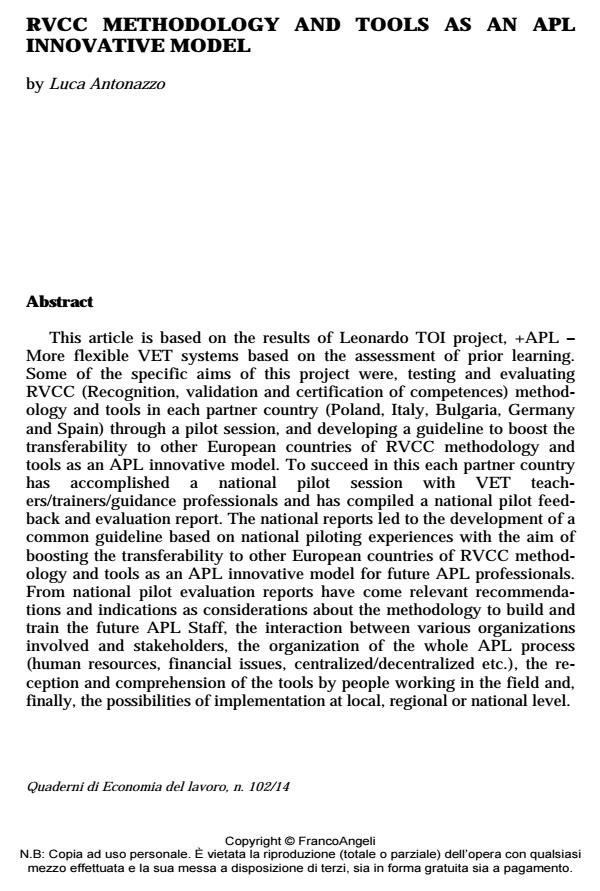RVCC methodology and tools as an APL innovative model
Titolo Rivista QUADERNI DI ECONOMIA DEL LAVORO
Autori/Curatori Luca Antonazzo
Anno di pubblicazione 2015 Fascicolo 2014/102 Lingua Italiano
Numero pagine 6 P. 55-60 Dimensione file 38 KB
DOI 10.3280/QUA2014-102005
Il DOI è il codice a barre della proprietà intellettuale: per saperne di più
clicca qui
Qui sotto puoi vedere in anteprima la prima pagina di questo articolo.
Se questo articolo ti interessa, lo puoi acquistare (e scaricare in formato pdf) seguendo le facili indicazioni per acquistare il download credit. Acquista Download Credits per scaricare questo Articolo in formato PDF

FrancoAngeli è membro della Publishers International Linking Association, Inc (PILA)associazione indipendente e non profit per facilitare (attraverso i servizi tecnologici implementati da CrossRef.org) l’accesso degli studiosi ai contenuti digitali nelle pubblicazioni professionali e scientifiche
This article is based on the results of Leonardo TOI project, +APL - More flexible VET systems based on the assessment of prior learning. Some of the specific aims of this project were, testing and evaluating RVCC (Recognition, validation and certification of competences) methodology and tools in each partner country (Poland, Italy, Bulgaria, Germany and Spain) through a pilot session, and developing a guideline to boost the transferability to other European countries of RVCC methodology and tools as an APL innovative model. To succeed in this each partner country has accomplished a national pilot session with VET teachers/ trainers/guidance professionals and has compiled a national pilot feedback and evaluation report. The national reports led to the development of a common guideline based on national piloting experiences with the aim of boosting the transferability to other European countries of RVCC methodology and tools as an APL innovative model for future APL professionals. From national pilot evaluation reports have come relevant recommendations and indications as considerations about the methodology to build and train the future APL Staff, the interaction between various organizations involved and stakeholders, the organization of the whole APL process (human resources, financial issues, centralized/decentralized etc.), the reception and comprehension of the tools by people working in the field and, finally, the possibilities of implementation at local, regional or national level.;
Luca Antonazzo, RVCC methodology and tools as an APL innovative model in "QUADERNI DI ECONOMIA DEL LAVORO" 102/2014, pp 55-60, DOI: 10.3280/QUA2014-102005